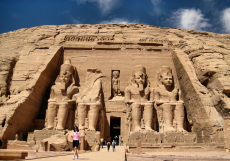
Southern Africa presented a far different situation for Britain as they had competition from the Boers rom the Orange Free State and the Transvaal. I believe that it was not just economic gain that was a major factor in why they wished to obtain influence here. Their major motive to obtain influence in Southern Africa was so they could control one of the many routes to India which was through the Cape, without which, India was at risk of being lost. There is evidence of this because in 1877 when the Boers asked Britain for support to fight the Zulus, Britain accepted, defeated the Zulus and annexed the Transvaal. This was done in order to gain a foothold in South Africa in which they could start establishing formal control from. There strategic actions were therefore an attempt to fulfil a strategic motive to protect the route to India meaning that India itself could be protected via the Navy and the army to ensure its safety.
However, in the First Boer War the Boers took back the Transvaal and by 1884, thanks to the Treaty of London, Britain had lost complete control in the area. This was dangerous for Britain because this gave countries such as Germany the chance to form links with the Transvaal and threaten the Cape route to India. In 1886 gold was discovered in the Transvaal meaning that now Britain had an interest in obtaining the Transvaal for economic reasons. In 1895 Cecil Rhodes was Prime minister of the Cape Colony and he supported the Jameson raid in 1895. He was a man whose interest was in wealth and therefore the Transvaal offered the opportunity to fulfil his own financial motives.
However the raid failed and he was forced to resign. Strategic motives again became the focus again because the attitude of many outspoken politicians such as Chamberlain believed that Britain must have complete control to protect its interests in the area. Their strategic motives were very important then as the Second Boer War broke out and despite some major set-backs Britain did not give in until they had fully annexed the Orange Free State and the Transvaal. The fact that Britain were willing to wage a costly war showed that their want to gain influence must have been in an attempt to protect something even more valuable to the British Empire; India.
To conclude, I believe that the main extent to why Britain wanted to obtain influence in Africa from 1868-1902 was to fulfil Britain’s economic motives. Britain needed the vast array of raw materials to trade with and use to fuel the industrial revolution to continue being ‘The workshop of the World’ and keep ahead of other European countries. Although Britain made many strategic actions they were generally to serve economic motives. The exception to this was in Southern Africa. However as this was only one area of four I don’t believe it is a large enough reason for Britain’s interest in the whole of Africa. That’s why I believe that economic motives must be the cause, so that Britain could gain economic wealth and use it to gain power and therefore more economic wealth could be created then through further expansion.
Image: By Francisco Anzola (Abu Simbel Main Temple) [CC BY 2.0 (http://creativecommons.org/licenses/by/2.0)], via Wikimedia Commons

0 Comment:
Be the first one to comment on this article.